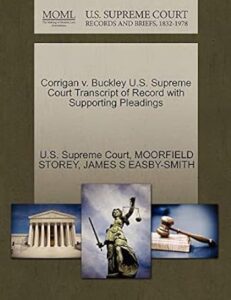
Corrigan v. Buckley
*On this date in 1926, Corrigan v. Buckley, 271 U.S. 323 (1926), was decided. This U.S. Supreme Court case ruled that the racially restrictive covenant of multiple residents on S Street N.W., between 18th Street and New Hampshire Avenue, in Washington, DC, was a legally binding document that made selling a house to a Black family a void contract.
Corrigan v. Buckley resulted from an infringement upon a covenant. An agreement was made in 1921 by 30 white homeowners that none among them would sell, rent, or allow Black people to obtain their land by any means. In 1922, Irene Corrigan broke the restrictions put in place by the covenant. Corrigan sold her land to a Black couple, Helen and Dr. Arthur Curtis. Corrigan vs. Buckley went through a five-year court case before it was finally settled by the Supreme Court in 1926. Buckley and the offense hoped that since the covenant was a written and signed document, it would be considered viable in a court of law. Curtis and Corrigan "moved to dismiss the bill on the ground that the covenant deprived the negro of property without due process of law, abridged the privileges and immunities of citizens of the United States, and denied him the equal protection of the law."
Corrigan and Curtis argued that not selling her house would violate Curtis's civil rights, but Buckley argued that the contract was binding and that Corrigan had no right to break it. The District Supreme Court sided with Buckley and stated that legal segregation happened all around D.C. and was a legal practice. The DC Court of Appeals also sided with Buckley. It stated that since blacks could exclude others from the neighborhoods in which they lived, it did not discriminate against them and so did not violate Curtis's civil rights.
Both courts used Plessy v. Ferguson, which legalized segregation if the separate races had equal facilities, to state their case. The NAACP kept the appeals process going to the Supreme Court. They cited that the racially restrictive covenants would "drive colored folk out of Washington." Once again, the court sided with Buckley. The ruling meant that Curtis's house purchase was void, and the covenant was upheld. This ruling set a precedent; soon after, racially restrictive covenants flourished nationwide. Subsequently, in Shelley v. Kraemer (1948), the court reconsidered such covenants and found that racially restrictive covenants are unenforceable.